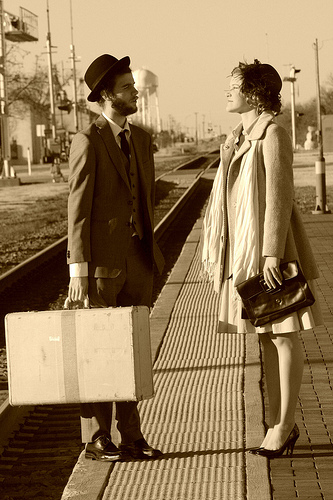
by Julie Sugar
For My Father:
With a Suitcase in Each Hand

“They are Americans,” my father often explained about my brother and me while we were growing up. It was a pronouncement delivered in his thick Hungarian accent, and bestowed upon us with a jumble of love and pride, distance and dissonance. I remember that after long dinners at other people’s houses, with food we didn’t like, my brother and I would want to go to McDonald’s. The proof seemed to be in the pudding (or in the fries): my brother and I were quite different from our European father, who disapproved of our preference for fast food. But what strikes me now that I’m older is that usually our dad agreed, drove us to McDonald’s, and bought us hamburgers. He wanted us to be happy, and he wanted us to be Americans.
My parents escaped Communist Hungary in 1976, and settled in New Jersey. Today, my father’s stories from his first years as a new immigrant are as well-worn and beloved as a favorite song. There was the time he was driving back with a new hairdryer for my mother; he saw a sign that said “U-Turn Next”, and turned around because he didn’t know what the word “next” meant. (My mother wryly remarked in Hungarian, when my dad finally got home, “My hair is dry now.”) Or there was the time he arrived at a house for dinner and asked if he could see their closet. His hosts were confused, but obliged. Then it was my father who was confused—in Hungarian, a common word for “bathroom” is “vécé”, which is the Hungarian pronunciation of “WC”, which comes from the English phrase “water closet”… which is not used in the United States. He needed to pee and was looking at a bunch of hangers and coats.
When I was five, my dad—a chemical engineer—was relocated to a new position in Houston. My mother had recently and suddenly passed away, and so it was the three of us who moved: me, my brother, and my father. As I grew up, the impression I formed of my father was that being an immigrant means you don’t completely fit in either place; you are a foreigner in your new country, and you’ve also become a foreigner in the country from which you came. Once when my dad visited Hungary, he wanted to buy some grapes from a man selling them on the street. When my dad asked whether the grapes had seeds (since he was used to the variety in the States), the man snapped, “Of course they have seeds, you idiot!”
The way my father has always described his sensation of displacement in both places is that he’s “internationally homeless.”
It’s a sentiment that is increasingly resonating with me, though in a very different context. Lately I feel as if I’m an immigrant too—not to a new country, but to religious Judaism and Jewish ritual life. I grew up secular and became more observant as a young adult. It was a world I both chose and didn’t feel totally at ease in; then, when I became less observant again, I found that I wasn’t comfortable returning to my original lifestyle, either. Now I’ve returned once more to observance, and am more or less at peace with it… except for all the moments when I’m not.
Immigrating is a choice that many people ultimately make not for themselves and their own comfort, but for their kids. My father may feel like he’s internationally homeless, but he also successfully changed the direction of his life so that his children could be Americans. While I don’t always feel 100% comfortable in an observant lifestyle, I think I will want my children—if I have them—to grow up in an observant home. Perhaps that sounds hypocritical, but it makes a kind of sense to me at this point.
After high school, I moved to New York; a couple of years later, my brother moved to New York as well. My father proceeded to pack up our Houston apartment: he sold furniture, threw away or donated mountains of stuff, put some boxes in storage, and said goodbye to fifteen years in Texas. Even though he had always hoped to return to the east coast, the transition to New York was bittersweet. “How many times do I have to leave a place with a suitcase in each hand?” he asked me after it was over.
His question reverberates. I wonder how many times I’ll travel from one identity to the next; I wonder if I’ll ever toss the suitcase, and really put down roots. I don’t know the answer to my father’s question—for him or for myself. But he’s shown me that it’s never too late to reroute and rewrite your life and (if you’re a parent) the lives of your children. That is something I will carry with me wherever I go.
Julie Sugar is a writer living in Brooklyn, New York. She can also be found on Twitter @juliesugar.
Photo credit: Pioneer Library System via photopin cc